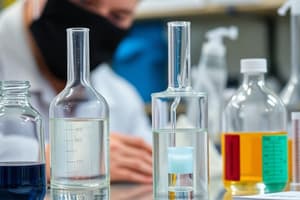Podcast
Questions and Answers
Observation is the starting point for all ______ endeavors
Observation is the starting point for all ______ endeavors
scientific
A hypothesis is a tentative explanation for an observed ______
A hypothesis is a tentative explanation for an observed ______
phenomenon
Hypotheses are formulated to guide ______ investigations
Hypotheses are formulated to guide ______ investigations
experimental
At its core, science is composed of several fundamental ______
At its core, science is composed of several fundamental ______
Experiments are the cornerstone of scientific ______
Experiments are the cornerstone of scientific ______
Observation is the careful, systematic, and detailed recording of phenomena in the ______ world
Observation is the careful, systematic, and detailed recording of phenomena in the ______ world
Through carefully designed experiments, scientists test their hypotheses to determine whether they are true or ______.
Through carefully designed experiments, scientists test their hypotheses to determine whether they are true or ______.
The first principle is that you must not fool yourself, and you are the easiest person to ______.
The first principle is that you must not fool yourself, and you are the easiest person to ______.
Data analysis allows us to make sense of the information gathered during experiments and ______.
Data analysis allows us to make sense of the information gathered during experiments and ______.
A theory is a well-established explanation for a group of phenomena, while a law is a statement that describes a relationship between ______.
A theory is a well-established explanation for a group of phenomena, while a law is a statement that describes a relationship between ______.
The scientific method involves the following steps: 1. Making an observation 2. Formulating a question 3. Developing a ______.
The scientific method involves the following steps: 1. Making an observation 2. Formulating a question 3. Developing a ______.
Effective scientific communication is essential for advancing our understanding of the natural world and addressing global ______.
Effective scientific communication is essential for advancing our understanding of the natural world and addressing global ______.
Flashcards are hidden until you start studying
Study Notes
Exploring the Building Blocks of Science
Science isn't just a collection of facts or experiments; it's a way of understanding the world around us through systematic observation and experimentation. At its core, science is composed of several fundamental elements that shape the way we ask questions, draw conclusions, and make discoveries. Let's delve into some of these foundational aspects of science.
Observation
At the heart of scientific inquiry lies observation—the careful, systematic, and detailed recording of phenomena in the natural world. Observation is the starting point for all scientific endeavors, allowing us to develop hypotheses and generate testable predictions. In the words of Galileo Galilei, "The book of nature is written in the language of mathematics." To understand the universe, we must first observe and record our observations in a systematic, methodical manner.
Hypothesis
A hypothesis is a tentative explanation for an observed phenomenon, based on available evidence. It is a testable prediction that can be proven true or false. Hypotheses are formulated to guide experimental investigations and serve as the foundation for scientific experiments. When designing experiments, scientists will often test multiple hypotheses simultaneously to broaden their understanding of a specific phenomenon.
Experiment
Experiments are the cornerstone of scientific inquiry. Through carefully designed experiments, scientists test their hypotheses to determine whether they are true or false. Experiments allow us to make observations under controlled conditions, and the results of experiments serve as evidence to support or refute a hypothesis. In the words of physicist Richard Feynman, "The first principle is that you must not fool yourself, and you are the easiest person to fool." To avoid self-deception, we must design experiments that are rigorous, objective, and reproducible.
Data Analysis
Data analysis allows us to make sense of the information gathered during experiments and observations. Using statistical methods, scientists can analyze their data to identify patterns, make predictions, and draw conclusions. Data analysis helps scientists to determine whether their hypotheses are supported by the evidence or whether they need to be revised.
Theories and Laws
Theories and laws are two fundamental concepts in science. A theory is a well-established explanation for a group of phenomena, while a law is a statement that describes a relationship between variables. Theories provide a framework for understanding the natural world, and they may be revised or replaced as new evidence emerges. Laws, on the other hand, are more concrete and can be used to make predictions. Theories and laws are interconnected, and they serve as the foundation for scientific understanding.
Scientific Communication
Scientific communication is the process of sharing information and ideas within the scientific community and with the general public. Scientists use a variety of media to communicate their findings, including written articles, presentations, and visual representations. Effective scientific communication is essential for advancing our understanding of the natural world and addressing global challenges.
The Scientific Method
The scientific method is a systematic approach to acquiring knowledge that is based on empirical evidence. The scientific method involves the following steps:
- Making an observation
- Formulating a question
- Developing a hypothesis
- Testing the hypothesis through experiments
- Analyzing the data
- Drawing conclusions
- Communicating the results
The scientific method is not a rigid set of rules; rather, it is a framework that allows scientists to ask questions, test hypotheses, and make discoveries.
In conclusion, science is a dynamic and ever-evolving field that is based on observation, experimentation, and critical thinking. By exploring these fundamental elements of science, we can make sense of the natural world and address the challenges of our time. As the physicist Albert Einstein once said, "Look deep into nature, and then you will understand everything better."
Studying That Suits You
Use AI to generate personalized quizzes and flashcards to suit your learning preferences.




